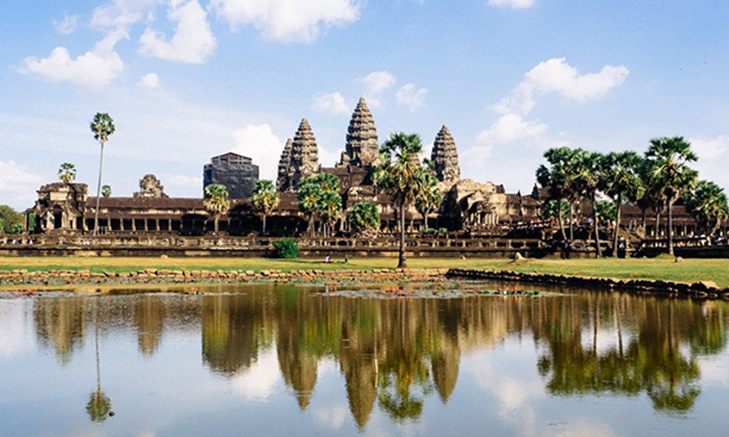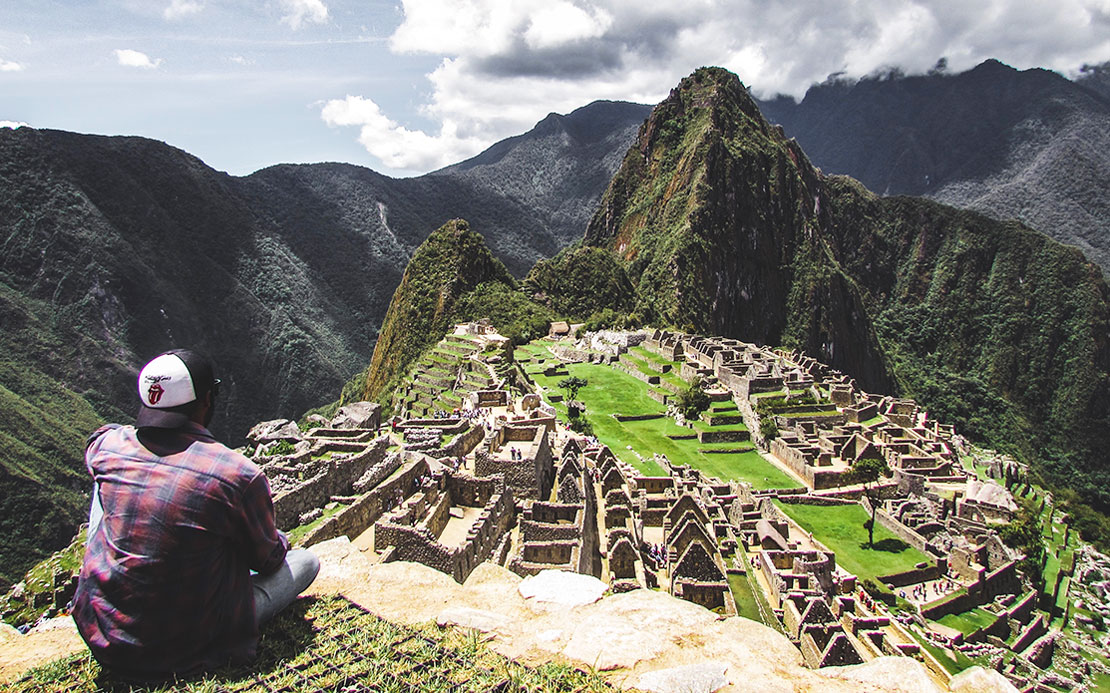Updated for 2023-2024
Thinking about traveling abroad? You’re not alone. People have been traveling for 2 million years. It began with Homo erectus, walking out of Africa in the early migrations. Then other archaic people followed, like H. heidelbergensis, the likely ancestor of modern humans, around 500,000 years ago.
Our ancestors spread to other continents, and along the way, they invented houses and built communities. They invented agriculture and changed the landscape. They invented religions and built temples. They created the special places we love to visit today, leaving a rich legacy of hope for a bright future.
We know about the paths early people took, and the things they made, from the development of the first stone tools at Lomekwi in East Africa 3.3 million years ago, thanks to the work of archaeologists. These scientists interpret the story of early people because there was no written record left behind, with the exception of handprints and animal paintings on cave walls. The historical record began with the system of writing, which began around 5,000 years ago in modern-day Iraq. Then people began writing their own stories. And even then, archaeology is able to fill in the gaps of those stories.
Some people consider archaeology a form of time travel – a way to peer into the past to gain a richer understanding of our world today, and our place in it. Are you curious about ancient people, wondering about who they were, where they came from, and what struggles and successes they encountered along the way? Here’s a quick survey that may help to unleash your inner Indiana Jones.
- When your grade school class visited the local museum, were you the student who lagged behind, staring at the mummy sarcophagus and ogling the artifacts in exhibit cases?
- When other kids were tuning into Nickelodeon, were you watching the History Channel while flipping through old issues of National Geographic?
- Do you roll your eyes and correct people when they say archaeologists dig for dinosaurs? (Inward sigh) “No, that’s paleontology.”
- Do you walk with your head down, your eyes constantly searching the ground in front of you for an unusual object?
- Do you solve puzzles and mysteries easily, because you love patterns and find them in all sorts of places?
- Do you browse the Duluth Trading Co. website for cargo pants and work boots instead of Net-a-Porter for literally anything else?
- Do you ever wonder how the ancient people of Cambodia constructed Angkor Wat, but more importantly, why? What is the meaning of Stonehenge? Were the pyramids of Egypt only burial chambers for the rich, or was there a more significant reason for the decades spent building each one? Why did people brave the cold and ice to cross the Bering Straits and populate the New World?
If these questions and others like them stir your interest, then you could be harboring the “Scientia Antiquitatis” gene, and there’s only one thing to do to find out. Get into the field and test yourself with an adventure that combines meaningful travel with history.
Archaeologists study people through time, from 3 million years ago to yesterday, by excavating, recovering, and analyzing material culture. Material culture is another word for artifacts and features – anything that was made or used by humans. Through archaeology, we can understand where and when people lived on the Earth, but also why and how they have lived.
Archaeology isn’t for the faint of heart. There are heat and cold, and rain and snow, and dirt and lots and lots of mud. There are bugs and snakes and the occasional bull that chases you out of their field. Your crew consists of people who look like construction workers but talk like scientists because that’s what they are. They rigorously study the cultures and lifeways of prehistoric and historic people. Like cultural anthropologists, they’re interested in what people do and why they do it, with one caveat: the people they study are long gone.
If you’d like to know more about archaeology, you can enroll in a university course, or you can check a book out of a library, but there’s nothing comparable to visiting and volunteering at an archaeology site. If you’d like to know more about important archaeology sites you can visit, and some that you can volunteer with, check out the archaeological volunteer opportunities below. One program you’ll definitely want to check out is Maximo Nivel’s Anthropology university program in Latin America, which include excursions to archaeological sites. With the exception of an actual archaeological field school, these may be the closest you’ll come to taking part in an archaeological dig and finding your own fortune and glory. If a university course isn’t for you, then check out GoEco, which offers an archaeological volunteer project near Cusco, and Volunteering Solutions, which offers archaeology programs in Greece. If you’re a teenage volunteer or part of a group, then definitely check out Projects Abroad’s archaeology volunteer program in Peru.
Featured Volunteer Abroad Programs
International Volunteer HQ

International Volunteer HQ (IVHQ) operates in more than 40 destinations worldwide and has placed more than 130,000 travelers on volunteer opportunities and adventure tours that heighten global awareness and cultural understanding. Founded in 2007, IVHQ offers programs in education and childcare, conservation and wildlife, community building, medical care, and much more. Volunteers are invited to stay abroad one week to six months, with affordable fees starting at just $20 per day.
Choose to work with IVHQ on a volunteer placement that gives you free time to visit archaeological sites, such as Angkor Wat, a UNESCO World Heritage Site in Cambodia. Or travel to Greece with IVHQ’s sister company, Intern Abroad HQ, and explore a variety of fields and rewarding career paths.
Cambodia Volunteer Programs and Archaeological Sites
IVHQ places travelers on several volunteer programs in Cambodia, a country with a rich history and magnificent, preserved temples. You can have a positive impact while you’re in-country, volunteering on a placement during the week, then traveling to Cambodia’s northern province of Siem Reap, to visit Angkor Wat, one of the most important archaeological sites of Southeast Asia. IVHQ’s volunteer programs in Cambodia include:
- Teaching English to school children
- Animal care at rescue centers
- Childcare
- Computer support
- Working with NGOs
- Special needs care
- Medical care
Orientation covers everything you need to know for your stay in Cambodia. Your coordinator will escort you on your first day volunteering, introducing you to the placement staff. Each day, you’ll be assigned a duty roster, with location and time at work dependent upon the project and location. You’ll stay with other volunteers in a shared house or homestay in Cambodia.
On weekends, take a tuk-tuk ride to the temple complex of Angkor Wat and learn about its thousand-year history and its significance as the largest religious monument ever constructed. Built around A.D. 1150 by the Khmer people as a Hindu temple dedicated to the god Vishnu, Angkor Wat was converted to a Buddhist site by the 13th century. Later, it even served as a military fortification. It is the pinnacle of Khmer architecture, a source of national pride, and is on the country’s national flag.
The 13th-century Chinese traveler Zhou Daguan wrote that the temple was constructed in a single night by a divine architect, however, archaeologists have determined that construction of the temple took place in the first half of the 12th century, during the reign of Suryavarman II (ruled 1113 – c. 1150). It was never completely abandoned, however, the encroaching jungle helped to hide and protect it from outsiders.
A number of countries such as France, Japan, and China are involved in various Angkor Wat conservation projects, hoping to preserve it for future generations and to protect it from the millions of tourists who visit the site each year. After your own visit to Angkor Wat, perhaps you’ll be inspired to learn more about Khmer architecture and how to read the bas-reliefs that depict the great epics of Hindu mythology. This program starts from just $360 for your first two weeks, and you’re invited to volunteer for up to six months. Learn more and apply here.
Intern in Greece
If you have four weeks or more to spare, spend them in Greece with Intern Abroad HQ, sister to IVHQ. Located along the Aegean Sea, you’ll be immersed in this amazing country’s history and its future. From outstanding opportunities that include GIS Mapping, Environmental Law, Communications and Media Relations, Marine Conservation, and more, there are plenty of internships that teach skills you can use in the field of archaeology.
You’ll stay in Samos and surrounding islands, situated on the Mediterranean Sea. Rich in Greek cultural and maritime history, you’ll learn something new each day when you visit the home of the Pythagoreion UNESCO World Heritage Site, and the birthplace of Pythagoras, Epicurus, and the astronomer Aristarchus.
Unlike chemistry or biology, archaeology didn’t exist as a separate science. It evolved as researchers “borrowed” theories and methodologies from other disciplines. In fact, it continues to evolve and adopt new technologies, including geographic information systems, or GIS, which is a computerized system designed to capture, store, manipulate, analyze, manage, and visualize all types of geospatial data. GIS has become integral in archaeology, as researchers study geospatial data through time. Brush up on the GIS software, ArcMap GIS, and use it in archaeology, or start your new career as a GIS technician, a cartographer, a surveying and mapping tech, or environmental engineer.
Now more than ever, archaeology relies upon the dynamic work of conservation, and preservation requires an understanding of international laws and policies. If you’d like to learn how to use legal work to protect and help the environment and significant archaeology sites, this important internship can place you on the path to a career as a research scientist, and educational outreach coordinator, and environmental scientist or a lawyer.
Media, Communications & Public Relations
Public Archaeology is an important component of the practice because people need to know what is worth protecting. If you enjoy communications, you can be creative and put your PR talents to good use for the environment and conservation efforts in Greece and beyond. Learn how to tell a great story through the tools of film, written word, photographs, and websites on this internship. Other careers that use these skills are education and outreach, NGO administrator, marketing managers, filmmaker, graphic designer, photographer, writer, public relations consultant, photojournalist, web designer, and more.
Fees for a four-week internship in Greece begin at $1,125 and includes 24/7 in-country support, airport pick-up, program orientation, internship placement, learning support service, accommodation and meals. Read more about Greece and the variety of projects that Intern Abroad HQ offers by clicking here.
GoEco
Since 2006, GoEco has offered affordable volunteer abroad programs and internships in over 45 countries throughout Africa, Asia, Australasia, Central America, Europe, the Middle East, North America and South America. With more than 170 different programs, GoEco is a great organization to check out if you’re looking for a variety of impactful volunteer abroad trips to choose from, from wildlife conservation to teaching English. GoEco was recently recognized as the Top Volunteer Abroad Organization from GoAbroad, Top Eco-Enthusiast by Greenmatch, and has been recommended by Buzzfeed, Huffington Post, the United Nations Convention to Combat Desertification and more. As a volunteer, you will have 24-hour support from the GoEco team, from start to finish.
Top destinations include South Africa, Australia, Bali, Costa Rica, Thailand, and Zimbabwe. Top activities include wildlife and animal conservation, marine and coral reef conservation, medical and healthcare, community aid and development, teaching English, and volunteering with children.
Volunteer in Peru – Archaeology Volunteering in Sacred Valley of the Incas
Volunteer in Peru’s Sacred Valley to help archaeologists protect Inca heritage. Assist in restoring sites, classifying artifacts, and mapping ancient landscapes. Immerse yourself in local traditions through weaving and ceramics workshops. Ideal for history lovers, this hands-on experience fosters cultural preservation while you explore breathtaking Andean scenery. Learn more about the program here!
Projects Abroad
Projects Abroad offers quality volunteer programs, and has placed more than 120,000 travelers worldwide to date. Founded more than 20 years as a small company started by students who wanted a break from school to travel and work in Eastern Europe, Projects Abroad has expanded to include offices around the world with more than 600 trained staff members. It is considered one of the world’s leading international volunteer organizations, with its mission of cultural exchange and freedom of choice.
Discover the secrets of ancient civilizations on one of Projects Abroad’s archaeology projects. You’ll work closely with experienced archaeologists, gaining practical experience on dig sites. These projects are an ideal way to boost your resume, particularly if you’re looking to go into a career in archaeology, or do something completely different.
You’ll also help preserve the country’s heritage and uncover clues that teach more about human behavior. For these projects, Projects Abroad has partnered with understaffed museums who need your help to excavate and restore artifacts. Your work will help ensure the stories of people who came before are not lost to history.
Work on an Inca and Mayan Dig Site in Peru
Discover the fascinating history of South America on Projects Abroad’s Archaeology Project in Peru. You’ll collaborate with archaeologists and historians from the Peruvian Ministry of Culture. As a volunteer, you’ll get your hands dirty on dig sites around the UNESCO Heritage Site, Cusco. All your work will help preserve Mayan culture and history. These are some of the tasks you’ll do:
- Measure out sites and help with excavations
- Uncover ancient structures and help with maintaining them
- Clean and restore artifacts
- Attend workshops about Peruvian history to deepen your knowledge
- Raise awareness about the importance of preserving cultural heritage
You’ll stay with a host family, and start dates are flexible. No experience is necessary. This placement lasts two weeks or more. Read more and sign up here.
Global Vision International
Global Vision International (GVI) offers volunteer trips and internship opportunities in Africa, Asia, Australasia, Europe, and the Americas. Founded in 1997, GVI places 2,000 participants abroad every year, with more than 20,000 travelers placed to date. Projects range from critical community development, environmental conservation, teaching, and more. GVI also provides interns with outstanding opportunities to develop professional skills through training, qualifications, and work placements. GVI partners with prolific organizations such as Save the Children, The Red Cross, WWF, SANParks, and The Jane Goodall Institute, as well as smaller, community-based organizations with grassroots initiatives.
If you’re thinking archaeology is all about digging in the dirt, think again. Many archaeologists are venturing underwater, investigating prehistoric and historic sites and features, including shipwrecks and sunken cities! If you’d like to consider an archaeology adventure that takes you beneath the sea, take a look at a GVI scuba diving program. Archaeologists are scientists who use the theories and methods of all other fields of study because they want to know how people react with and within their environment. When you focus on a placement that includes marine conservation, you’ll understand how archaeological sites are preserved differently underwater, and how they require different research skills and excavation techniques. If you’re interested in archaeology minus the digging, this may be the experience you’ve been looking for.
Marine Conservation & PADI Advanced Open Water Course
Discover the underwater world and develop your skills as a PADI scuba diver on this GVI placement in the Yucatan Peninsula of Mexico. This program is designed for students under 18 who already know how to dive and are seeking PADI Advanced Open Water certification. If you’re interested in learning how to dive, check out the marine conservation awareness program here.
Since you’ll be learning from scuba diving experts, you’ll learn more about marine conservation and experience some of the best diving conditions the world has to offer. After participating in this program, you’ll be a confident diver, which allows you to research safely. Your data will contribute to the long-term survival of the reef while becoming educated about local and global issues. There are many shipwrecks in the Yucatan, mostly Naval vessels that were deliberately sunk and turned into artificial reefs, such as MUSA (Museo Subacuático de Arte), an underwater art project/museum in the waters surrounding Cancun.
You’ll also have a chance to swim with turtles and dolphins while you work to raise environmental awareness and help to minimize the impact. On the weekends, turn your archaeological eye inland and explore ancient Mayan cities and ruins, trek tropical jungles, and may even visit a cenote, an underground river. This placement lasts two weeks with a fee of $3,590. Learn more here!
Ready to Travel?
Travelers love places, but the truth is, they love people more because people make the places you visit special. With a bit of ingenuity, you can create an internship of your own when you mix archaeology fieldwork and community outreach on a placement abroad.
If you have an interest in conservation, preservation, research, or excavation, chances are you can find an opportunity with a volunteer travel company that allows you to explore ancient ruins and do good at the same time. Choose from one that has a specific archaeology project, or talk with your adviser at university to design your own (and earn academic credit in the process). Create your own archaeological field school: pull out your atlas today and start imagining your archaeological adventure abroad!


Robin Van Auken · Writer
Robin is a researcher, writer, and a registered professional archaeologist, a skillset she uses every day as a cultural communication specialist with Hands-on Heritage. Her projects connect communities with an emphasis on interpretation and education and conserve cultural and environmental legacies.